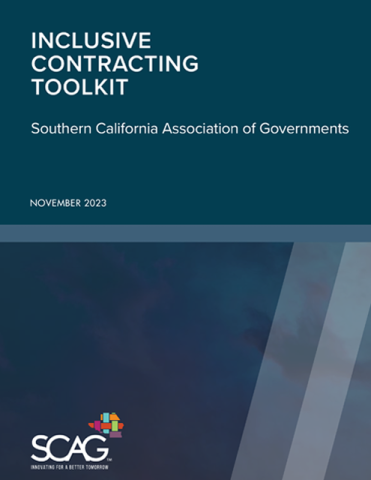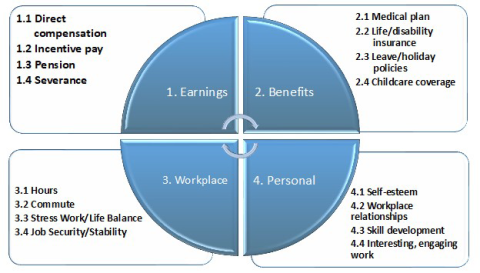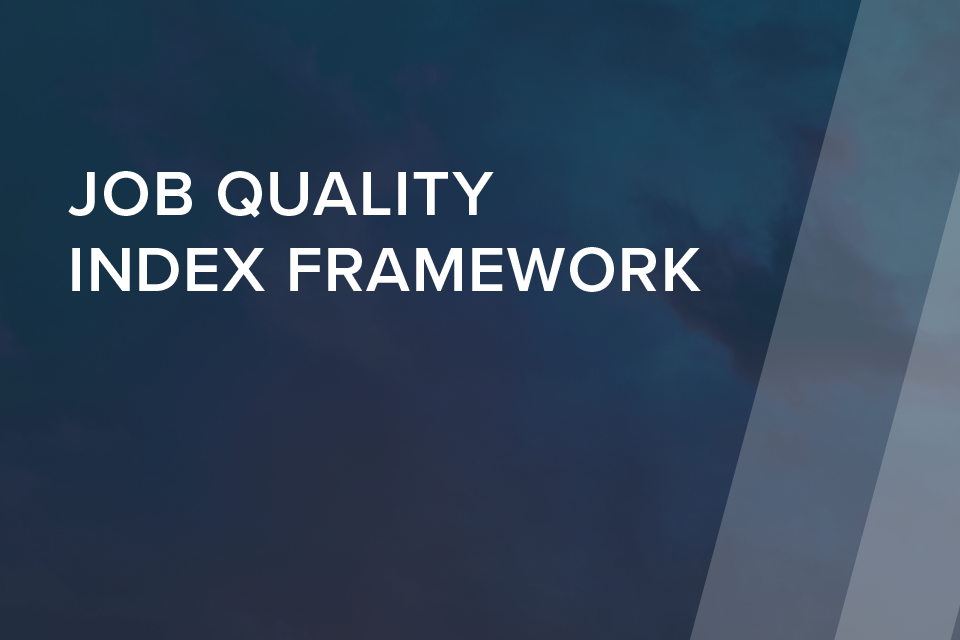Our Work
- Connect SoCal
- Inclusion, Diversity, Equity & Awareness
- Programs & Projects
- Housing
- Economy & Demography
- Federal & State Compliance
- Sustainability
- Transportation
- Active Transportation
- Aviation Program
- Regional Pilot Initiatives Program
- The Future Communities Initiative
- Transportation Demand Management
- Transit Program
- FreightWorks
- Passenger Rail Program
- Corridor Planning
- Transportation Safety
- Transportation Finance
- Intelligent Transportation Systems
- Southern California Transportation Study
- Local Resources
- Funding & Programming
- Legislation & Advocacy
- Publications & Reports
Inclusive Economic Recovery Strategy

The Inclusive Economic Recovery Strategy (IERS) identifies ways that SCAG can work with local partners to foster inclusive economic prosperity as the region continues to recover from the economic and social disruptions of the COVID-19 pandemic. The IERS reflects SCAG’s commitment to justice, equity, diversity and inclusion and the final report will help SCAG further explore the integration of policy goals related to inclusive economic growth in the development and adoption of the Connect SoCal Regional Transportation Plan/Sustainable Community Strategy every four years.
SCAG developed the IERS as an activity of the Racial Equity Early Action Plan in close collaboration with stakeholders and practitioners, focusing on recommendations that SCAG is well positioned to lead or implement with an appropriate partner. The SCAG Regional Council adopted the final “An Inclusive Economic Recovery Strategy for the SCAG Region” report and recommendations on July 1, 2021.
In Spring 2022, with support from State Senator Susan Rubio, SCAG received one-time grant funding from the California Workforce Development Board to implement several core recommendations from the IERS and to guide SCAG’s efforts in advancing inclusive economic growth.

The Inclusive Contracting Toolkit is a roadmap with actionable recommendations for procurement professionals in public agencies and private anchor institutions to implement inclusive contracting policies, programs, and practices. The toolkit includes a library of best practices and recommendations that reflect the range of emerging and promising inclusive contracting methods.
Recognizing all organizations approach to procurement uniquely, the Inclusive Contracting Toolkit provides insights into inclusive contracting by summarizing context, recommending immediate actions, and presenting proven tactics. The toolkit outlines policies, discusses challenges, suggests implementation steps, and provides real-world examples within the SCAG region. Moreover, it differentiates recommendations relevant to public agencies and private institutions and includes successful case studies from initiatives across the country.
The toolkit’s development included a thorough literature review and engagement with industry professionals and small business organizations. The Inclusive Contracting Technical Advisory Committee and industry focus groups provided invaluable insights, to firmly root the toolkit in the realities and opportunities currently facing procurement professionals in the SCAG region.
Download the Inclusive Contracting Toolkit
Quality jobs provide a foundation for economic growth and resilience against economic downturns. However, like many regions, Southern California has traditionally lacked data or frameworks to measure the quality of jobs in its large, complex economy. There are a wide range of approaches for measuring job quality overall—a task that becomes even more difficult when considering the nuances and limited data availability in a single region such as Southern California.
To create a new benchmark of understanding for the region’s job markets, SCAG today published the Job Quality Index Framework (JQI) as both a report and a database. The JQI can inform policy decisions and measure progress toward a more resilient, inclusive and equitable economy for Southern California, as outlined in Connect SoCal 2024. Policymakers and business leaders can use a clearer understanding of what workers want from jobs to improve sector competitiveness and workplace conditions. Workers can also benefit from improved quality of life.
SCAG’s Job Quality Index is weighted by the findings of a survey of 2,900 workers across demographic groups and geographic locations in Southern California. Survey respondents reported the importance of 16 job factors in four categories: 1) earnings, 2) benefits, 3) workplace conditions and 4) personal factors.

Figure 14: A SCAG Job Quality Index (JQI) Aggregating 16 Sub-Indicators
Survey results vary widely by industry and county, but a few consistent themes emerge: All workers value direct compensation, but women show a much higher preference for workplace conditions, while older workers show a lower preference for childcare coverage.
Job characteristics, measured by economic indicators and weighted by preference, vary by geographic locations, industry and demographic groups. For example, the index shows a higher score for direct compensation in Public Administration and a lower score in Arts, Recreation, and Hospitality, suggesting that real wages are higher and more important in Public Administration, as shown in the figure below.

Figure 15: JQI of Earnings sub-indicators across industry (100 = average quality)
The Job Quality Index report also includes a review of relevant literature, which reveals several trends at work in the regional economy:
- Less than half of American workers are in good jobs.
- Low-income workers are far less likely to receive employment benefits, from health insurance and retirement plans to maternity and sick leave.
- Older workers, white workers, and those with high levels of education are most likely to be in good jobs.
- Among sub-baccalaureate workers, certifications are strongly associated with good jobs.
- Workers in rural areas and small towns give higher job quality ratings despite lower average incomes.
- Workers across income levels generally agree on the most important job quality dimensions.
- Low-income workers are more likely to be “disappointed” with all aspects of job quality.
- Most workers say their pay has improved in the last five years, but other aspects of their job have not.
- Two-thirds of U.S. workers say they are currently in their “best job ever.”
- Job quality varies systematically by type of job (full-time, part-time, multiple), organization size, type of work, occupation, and sector.”
SCAG first proposed development of a county-level job quality index for the region in the Inclusive Economic Recovery Strategy (IERS) report (2021). The state of California awarded a one-time state grant, with support from State Senator Susan Rubio (D-District 22), for SCAG to implement the IERS, including development of the Job Quality Index. SCAG hired David Wells Roland-Holst, Ph.D., of Berkeley Economic Analysis and Research, to lead the collaborative development of the SCAG JQI. The Job Quality Index is designed to be updated and replicated as the economy and workers’ preferences evolve.
SCAG will continue to provide resources and tools, such as the Job Quality Index, and work with local partners to identify policy priorities, monitor job quality, identify areas for improvement and assess the effects of policy interventions.

The Inclusive Contracting Toolkit is a roadmap with actionable recommendations for procurement professionals in public agencies and private anchor institutions to implement inclusive contracting policies, programs, and practices. The toolkit includes a library of best practices and recommendations that reflect the range of emerging and promising inclusive contracting methods.
Recognizing all organizations approach to procurement uniquely, the Inclusive Contracting Toolkit provides insights into inclusive contracting by summarizing context, recommending immediate actions, and presenting proven tactics. The toolkit outlines policies, discusses challenges, suggests implementation steps, and provides real-world examples within the SCAG region. Moreover, it differentiates recommendations relevant to public agencies and private institutions and includes successful case studies from initiatives across the country.
The toolkit’s development included a thorough literature review and engagement with industry professionals and small business organizations. The Inclusive Contracting Technical Advisory Committee and industry focus groups provided invaluable insights, to firmly root the toolkit in the realities and opportunities currently facing procurement professionals in the SCAG region.
Download the Inclusive Contracting Toolkit

Quality jobs provide a foundation for economic growth and resilience against economic downturns. However, like many regions, Southern California has traditionally lacked data or frameworks to measure the quality of jobs in its large, complex economy. There are a wide range of approaches for measuring job quality overall—a task that becomes even more difficult when considering the nuances and limited data availability in a single region such as Southern California.

